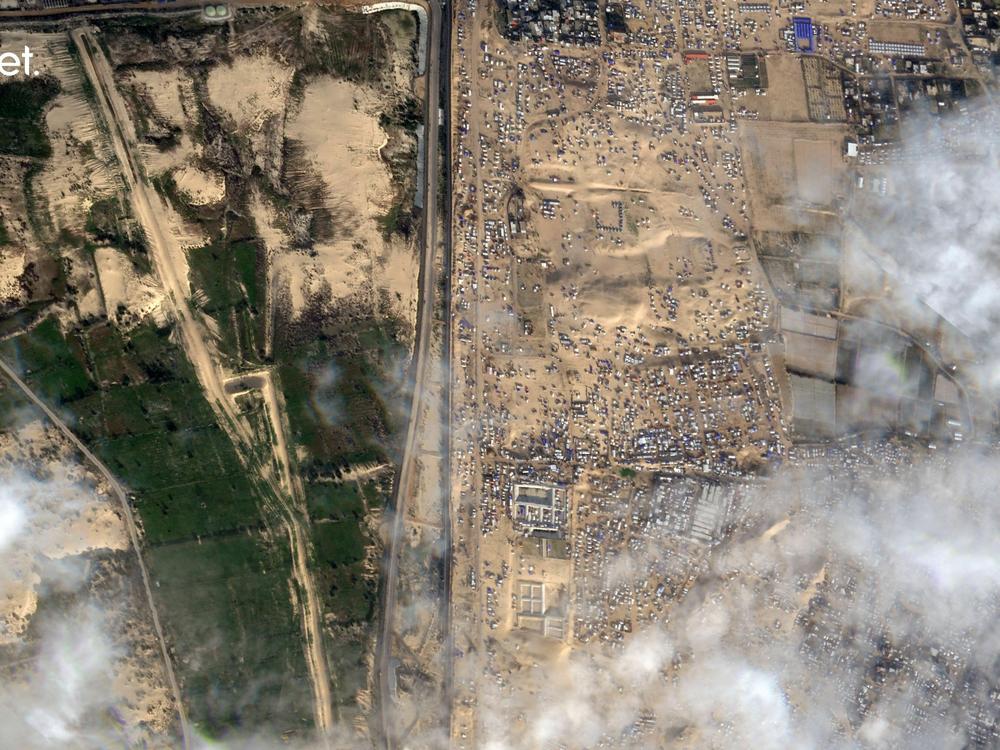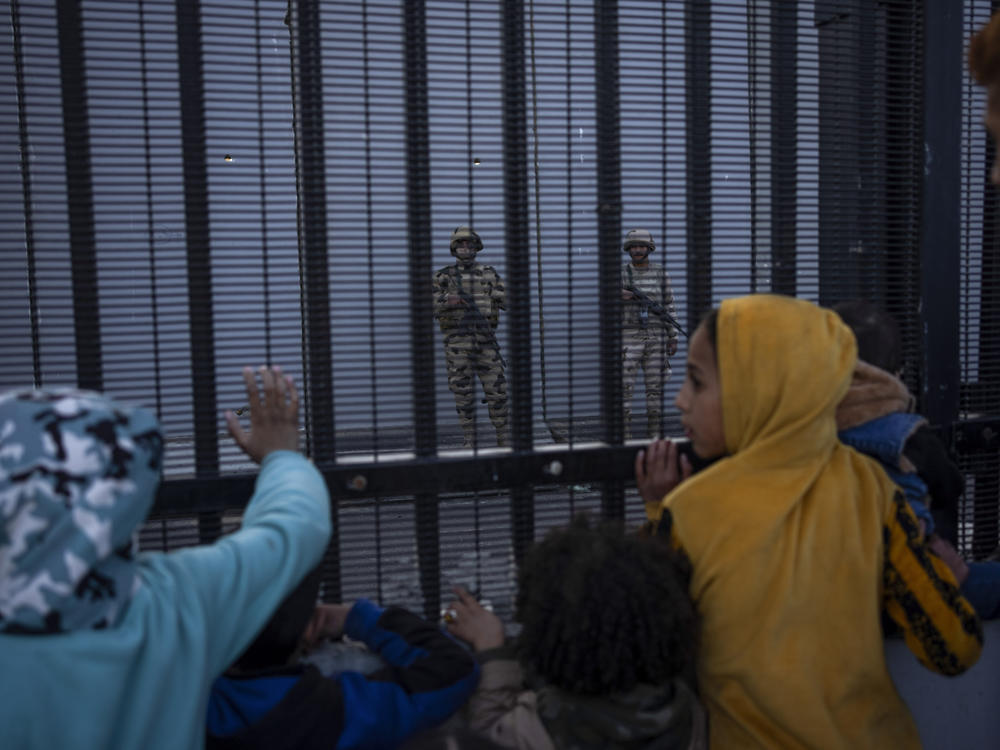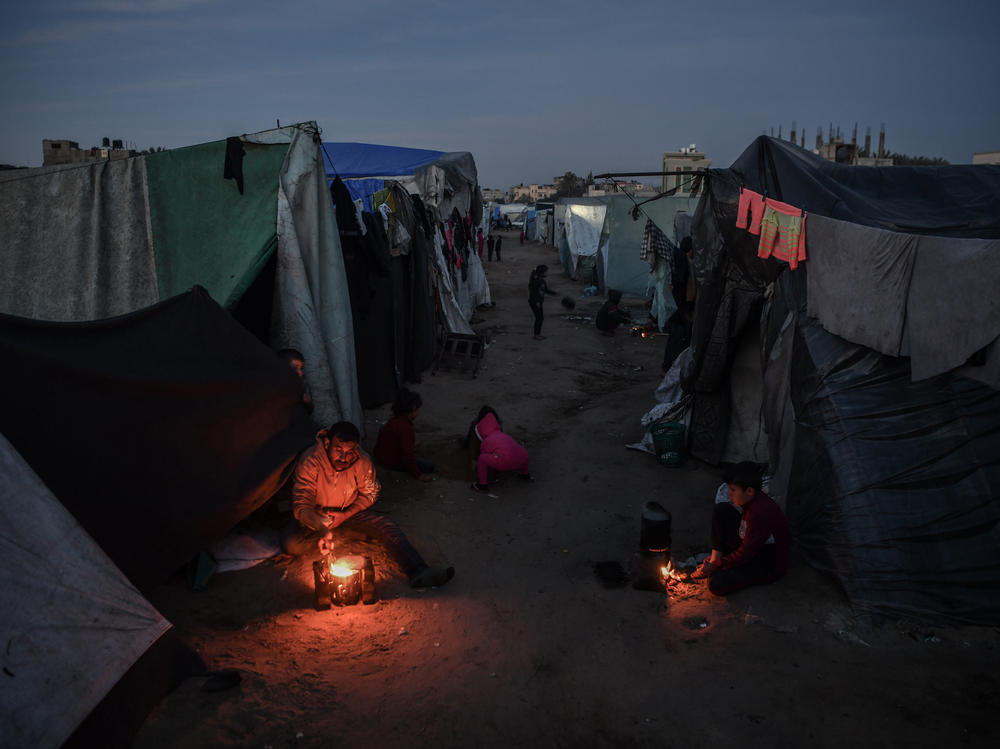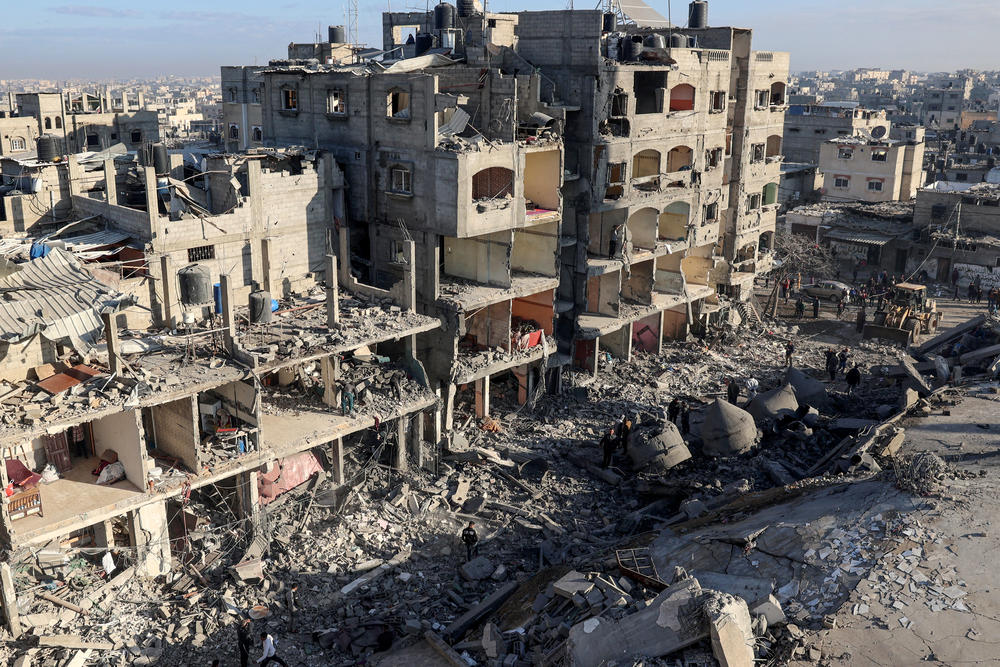Section Branding
Header Content
Why Egypt won't allow vulnerable Palestinians across its border
Primary Content
The satellite photo above captures the stark nature of the crisis on the Gaza-Egypt border.
On the right, more than 1 million displaced Palestinians are squeezed into tent camps on the Gaza side of the border, seeking shelter from Israel's ongoing offensive. On the left is Egypt's vast, thinly populated Sinai Peninsula, where the tightly controlled frontier has a heavy security presence.
This territory could provide a temporary safe haven for Palestinians from Gaza, where more than 29,000 people have been killed and nearly 70,000 wounded since the war began in October, according to Gaza's Health Ministry.
Egypt, however, has warned against an influx of refugees. It facilitates humanitarian aid into Gaza, but has said a mass exodus of Palestinians out of Gaza into Egypt is a red line, saying it fears Israel might never let the Palestinians go back.
Egypt, one of the few countries that talks to both sides in the current war, is a key mediator between Israel and Hamas and is working to broker an end to Israel's war in Gaza. These efforts have taken on added urgency as Israel threatens to mount a major offensive in the southern Gaza town of Rafah, which sits on the border.
Egyptian officials told NPR that the talks are focused on a six-week cease-fire that could be extended. The Egyptian officials spoke on condition of anonymity to discuss details amid sensitive, ongoing negotiations.
Egypt has facilitated, with U.S. backing, the entry of life-saving aid into Gaza through the Rafah border crossing. Each aid truck is inspected first by Israel before it enters Gaza, delaying and curtailing the entry of fuel, medicine, food and other aid.
The current crisis is very much linked to the painful history of the Israeli-Palestinian conflict. Most of Gaza's 2.2 million people are the descendants of Palestinians who were forced out or fled their homes in the first major Israeli-Palestinian war in 1948-49.
There are fears of permanent displacement and conflict spilling over
The possibility of another Nakba, or catastrophe, as Palestinians refer to their displacement more than 70 years ago, makes many today determined to stay put in Gaza.
Egyptian officials, meanwhile, have said this would end hopes for a future Palestinian state, something Cairo doesn't want to be seen as facilitating or abetting. Early in the war, Egypt's government even briefly called for public protests against forced displacement and in support of the Palestinians.
At the same time, Egypt doesn't want to be dragged into the war if militants infiltrate an open border, prompting Israeli attacks and Egyptian counterattacks.
Egypt's President Abdel Fattah el-Sisi said early in the war that he believed Israel was trying to push Palestinians into his country by curbing supplies of food, medicine, fuel, water and other basics in the territory.
Israel's government says it has no such intent. But a few of the more extreme members of Prime Minister Benjamin Netanyahu's right-wing coalition have called for Palestinians to be forced out. Some have even spoken about rebuilding Jewish settlements in Gaza, which Israel dismantled in 2005.
Such talk makes Egyptians and Palestinians nervous about what's coming next.
Karin Huster, a medical coordinator for Doctors Without Borders, recently spent five weeks in Gaza, including Rafah.
"I've never heard anybody say, 'We want to go to Egypt.' They just want to be in a place where they don't get bombarded. Where they can sleep and where they can wake up the next day alive," she tells NPR. "Some people have even told me, 'I want to go back to my home. And even if it's destroyed, I'll put my tent there and it'll be safer. At least I will die at my home.'"
She says she saw some families packing mattresses and whatever else they could carry and heading to the coast — literally setting up tents on the beach — in anticipation of a major Israeli military push into Rafah. While in Rafah, she survived intense Israeli air and naval bombardment in an operation that freed two Israeli hostages but killed dozens of Palestinian civilians, including many children, according to Gaza's health ministry. Hamas is still holding more than 130 hostages its militants seized in the Oct. 7 attacks, in which Israel says 1,200 people were killed.
In recent weeks, Egyptian diplomats have signaled to some of their Western counterparts that Egypt could suspend its 1979 peace treaty with Israel if an Israeli offensive in Rafah pushes people into the Sinai. This would upend a key security agreement brokered by the U.S. that ushered in peace between the two neighbors after several wars.
"What we have indicated is that the displacement [of Palestinians] into our territory is a red line," Egypt's Foreign Minister Sameh Shoukry recently told the PBS Newshour. "And we appreciate all those who have also indicated that they refuse displacement into Egyptian territory."
There also are fears about a possible Israeli offensive
Netanyahu and Israeli security officials say they're planning for a military offensive against Gaza's southern border town of Rafah, which they say is the last Hamas stronghold in the territory.
Netanyahu has also ordered the military to come up with a plan to evacuate the Palestinian civilians crammed into the Rafah area. But so far there's no sign of an actual blueprint. And with much of the territory in ruins, and aid supplies limited, it is simply not clear where the displaced Palestinians would go.
President Joe Biden, a staunch supporter of Israel throughout the war, has warned Netanyahu against an offensive in Rafah without a clear plan for relocating the more than 1 million civilians there first.
Egypt builds a wall near the border
While Egypt continues to push for a temporary cease-fire between Hamas and Israel, it is also preparing for the possibility of an Israeli push into Rafah and the possible influx of Palestinians. Recent satellite photos showed bulldozers and earth movers have cleared substantial tracts of land near the border.
Egyptian officials, speaking on condition of anonymity in order to discuss security arrangements, tell NPR that a cement-walled security perimeter is being built near the border to hold up to 150,000 people in the event of a breach of Egypt's border during an Israeli assault on Rafah.
Egypt has made limited exceptions to people trying to flee Gaza throughout the war. Some war-wounded, with approval from Israel, have been allowed to cross into Egypt for treatment abroad. Palestinians with second passports and those with connections to Western entities have also been allowed to leave Gaza, as have those who've been able to raise thousands of dollars for special visas.
Overall, though, Israel's siege of the Gaza Strip has entrapped the territory's population, unlike other wars where refugees can find a country to flee to.
When Russia launched a full-scale invasion of Ukraine two years ago, millions of Ukrainians poured into neighboring Poland, which welcomed them.
When Syria descended into civil war in 2011, millions fled to neighboring countries. They included an estimated 120,000 Palestinians, who were already refugees in Syria before they sought shelter elsewhere, according to the U.N. agency that handles Palestinian refugees.
Egypt already hosts around 9 million refugees from the region, though it does not have formal refugee camps. The refugees live like long-term residents among Egyptians in big cities like Cairo. This is very different from the Palestinian refugee camps in several other Arab countries.
Greg Myre is a national security correspondent who was based in Jerusalem from 2000-2007. Aya Batrawy is an NPR correspondent based in Dubai.




